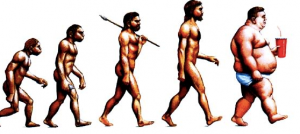
After one of my kids was diagnosed with a health condition last year, our doctor recommended that our whole family radically change what (we believed) was our otherwise healthy diet and embrace a way of eating that has popularly become known as the Paleo diet. “Paleo” is a term used to reference what many say were the eating habits of Paleolithic-era humans (more on that in a moment). This approach to food emphasizes the consumption of lean meats, veggies, fruits, and nuts (all things that one would hunt and/or gather, so the story goes) at the same time that it eschews grains, dairy, legumes, and all refined, processed, or artificial foods.
A little internet reading could easily convince the novitiate that there is a Paleo god looking to strike dead those who stray from its parameters, for there are a myriad of Paleo folks out there who argue vehemently about what constitutes the “truest” Paleo lifestyle. Despite their differences, the philosophical tie that unites most Paleo adherents is the sense that “eating like a caveman” is the most “natural” and “authentic” approach to food possible, one closest to how our bodies are “designed” to be fed. Good health is often promised as the result of firm adherence to the philosophy, and this is the rationale Paleophiles have long provided for why so many people experience a multitude of positive health benefits when they follow it. Continue reading “Caveman Grub: The Identity Politics of Paleo”
